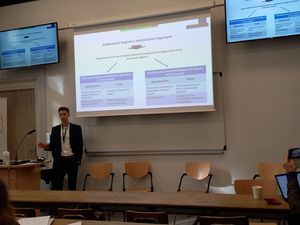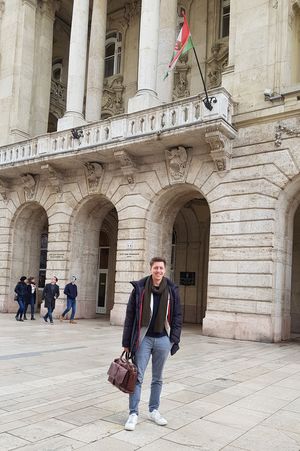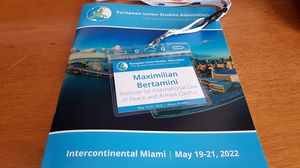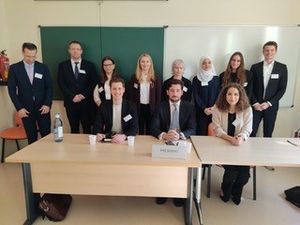- Sie sind hier:
- Startseite
- Promovierende
- Förderprogramme zur Internationalisierung
- International Realization Budget
- Funded Internationalization Concepts
- Maximilian Bertamini
Space Mining between Sovereignty and Property
The Research Project
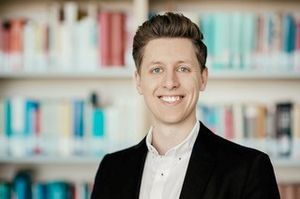
As non-renewable resources on Earth must expire, humanity starts reaching for the stars for new supplies. Luckily, there are many documented near-Earth asteroids rich in highly valuable resources. Extracting them is called “Space Mining” – and the necessary technology is being developed today. Stakeholders of Space Mining (states and private entities) expect vast benefits from acquiring property rights in outer space. For international lawyers, it depends on the understanding of two concepts, if these expectations can be fulfilled: sovereignty and property. These notions determine who may exercise a certain type of power over a certain object. Their relevance for outer space arises from a unique provision of international law. Article II of the Outer Space Treaty (OST) provides that outer space, including the moon and other celestial bodies, is not subject to “national appropriation”.
This PhD project aims at understanding the legality of property acquisition in outer space. It argues that understanding the scope of “national appropriation” in Article II OST requires to understand the concepts of sovereignty and property, as “national appropriation” blends the two together: The term "appropriation" is inspired by property law, while only national appropriations are prohibited, alluding to states and sovereignty. In a first step, the concepts of sovereignty and property in international law will thus be examined, underpinned by legal theory, legal history and political philosophy. In a second step, Article II OST will be interpreted against the backdrop of the results of Step 1.
IRB Funded Activities
World Conference on Humanitarian Studies, Paris (November 3rd to November 5th, 2021)
From November 3rd to November 5th 2021 I participated in the World Conference on Humanitarian Studies in Paris – my first conference participation powered by IRB! Over the course of three days I presented two papers which relate both two my work at Ruhr-University’s Institute for International Law of Peace and Armed Conflict generally as well as to my doctoral research specifically. The participation in person allowed me to get in touch with scholars and practitioners from all around the world and to not only receive feedback on my current work, but also inspiration and partners for the projects ahead. I am already looking forward to continuing the discussions initiated in Paris and to making the best use of the remaining IRB.
Philip C. Jessup International Law Moot Court Competition in Budapest (March 2022)
In early March 2022 I participated in the European Friendlies Rounds of the Philip C. Jessup International Law Moot Court Competition in Budapest. This year’s case featured central questions and arguments revolving around sovereignty and property, which are the main concepts in my PhD research. During the competition, I was fortunate enough to connect and discuss with students, scholars and practitioners from around the world. Eventually, I was even voted to be one of the three best judges in the competition, which is a reflection on how much fun and inspiration the whole competition was for me.
17th Biennial Conference of the European Union Studies Association in Miami (May 2022)
From 19th to 21st May 2022, I presented an extensive research paper on the concept of European Sovereignty in light of the Covid-19 pandemic together with my first supevisor at the 17th Biennial Conference of the European Union Studies Association in Miami. After roughly 1.5 years of completing the sovereignty-stage of my PhD project, I took the opportunity to condense and transfer my findings to the context of the European Union in order to test their abstract validity and to expose them to a specialist audience. The feedback I received was very valuable for the paper and for my overall PhD project alike and gives me confidence to move on to the next stage of my project.
Philip C. Jessup International Law Moot Court Competition in Geneva (March 8th to 12th)
From March 8th to 12th I participated as a Judge in the European Friendlies of the Philip C. Jessup International Law Moot Court Competition in Geneva. Staying involved with Jessup is the perfect opportunity to stay up to date on recent and often contentious issues of international law, discuss research and views as well as network. This year's case again involved issues close to my own field of research (property under international law), which is why I am particularly grateful for the opportunity to participate!
Manfred Lachs Moot Court for Outer Space Law in Jáen, Spain (April 17 to 21)
The European Centre for Space Law invited me to serve as a Judge in the European Rounds of the Manfred Lachs Moot Court for Outer Space Law from April 17 to April 21 in Jaén, Spain. Participating in the competition allowed me to discuss legal issues of space exploration with students, young professionals and established scholars from all over Europe. The case this year revolved around anti-satellite missiles and liability questions arising from their use. I am grateful for the Research School’s support in seizing this opportunity, as all conversations I had in Jaén deepened my knowledge of space law, expanded my network and confirmed the choice of my PhD topic.
- Forschungsbezogene Kompetenzen: Workshops & Veranstaltungen
- Karrierevorbereitung: Workshops & Veranstaltungen
- Forschungsmanagement Skills: Workshops & Veranstaltungen
- Liste aller Workshops & Veranstaltungen
- Förderprogramme zur Internationalisierung
- Beratung & Ombudsperson
- Promovierenden-Datenbank
- Welcome Hour
- Newsletter



